Table of Contents
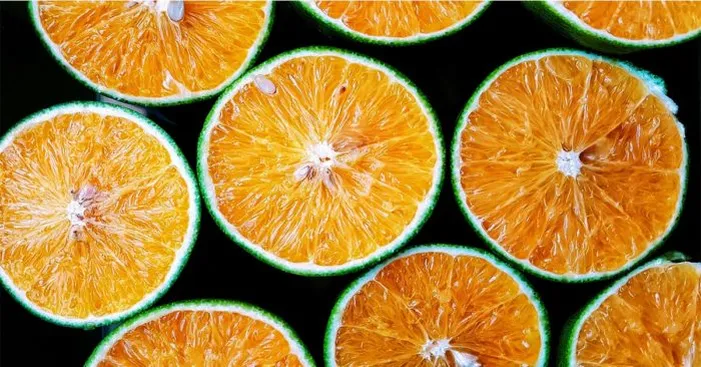
Mandarin orange calories are full of beneficial properties that can boost your overall health.
This fruit is very famous across the world for its sweet and refreshing flavor but only a few people know how good it is for our bodies.
In this article, we gathered all the information you need to know about mandarin orange calories, health benefits, and the precautions you need to know before consuming it, alongside tips on how to buy + consume and store mandarin oranges.
Difference between clementine and mandarin orange:
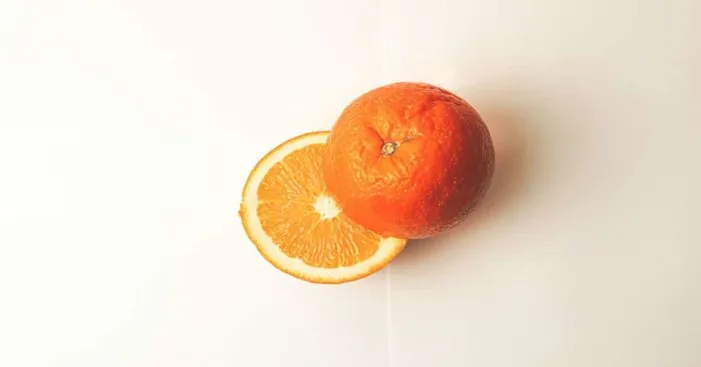
Mandarin is particularly sweet which makes it one of the least acidic types of oranges.
Also, it contains a lot of seeds and it ripens one month earlier than clementine varieties.
On the other hand, clementine was in fact made by crossing a mandarin orange tree with a sour orange tree.
In honor of its creator Brother Clément, this type of orange gained its name “clementine”.
Since clementine is a hybrid tree, the fruits bare no seeds and can only reproduce artificially or with pollen of other citrus trees nearby.
History of mandarin:
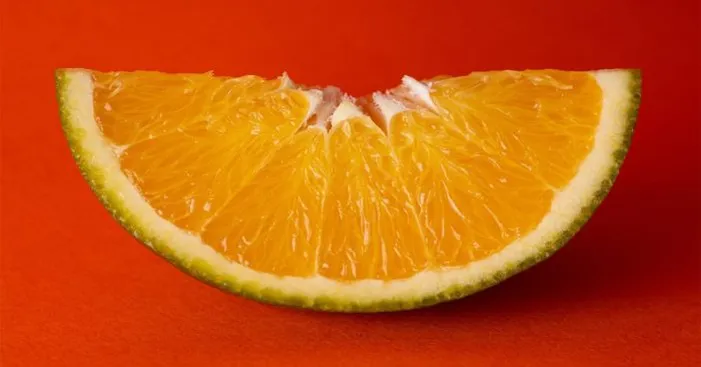
Mandarin oranges go by different names as it is called Mandarin in Italy, Suntara in Hindi, Chieh in China, and Mikan in Japan.
However, the first time people discovered mandarin orange in China they were captivated by its bright orange color.
As a result, they decided to name it after their traditional mandarin costumes which have a combination of orange and red colors like a mandarin orange.
The mandarin orange is a natural wild fruit that first grew in different parts of Asia about 3000 years ago.
In addition, mandarin along with Pomelo and Citron is the mother tree of all types of citrus fruits including lemons.
Types of mandarin:
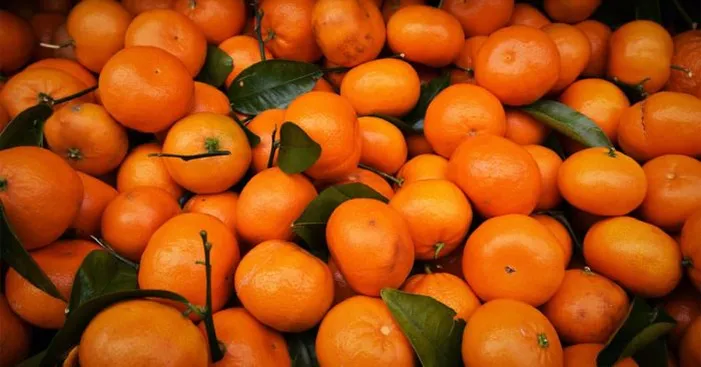
The word “mandarin” refers to many types of hybrids originated by crossing mandarin with other types of oranges, for example:
Commercial mandarin is widely produced in Tunisia, Morocco, Italy, Florida, Spain, and South Africa from September to April.
Tangelo orange is a cross between mandarin and pomelo which gives the fruit a slightly sour flavor.
The next mandarin hybrid is also a famous one and that is the well-known “clementine” as they are a cross between mandarin and Corsican and mandarin.
Many famous mandarin hybrids can also be called « mandarin » but those 3 are the most famous ones.
Mandarin orange calories:
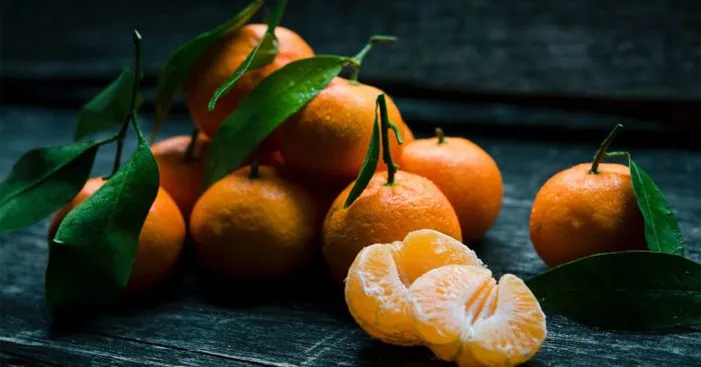
Nutritional values:
Mandarin orange contains more than 85% of water which gives it great hydrating properties.
Also, this type of orange is a great source of carbohydrates that are mainly present as fructose.
As for the caloric content, mandarin orange calories are just 54 per 100g which is very low concerning how nutritive this fruit is.
This data count for the recommended serving of 2 mandarin oranges (176g) per day:

- Calories: 93
- Fibers: 3.2g
- Proteins: 1.4g
- Carbs: 23g
- Sugar: 19g
- C vitamin: 52%
- B1 vitamin: 8%
- B5 vitamin: 8%
- B6 vitamin: 8%
- B9 vitamin: 7%
- Potassium: 6%
- Calcium: 5%
- Copper: 8%
- Magnesium: 5%
- Phosphorus: 3%
Health benefits:
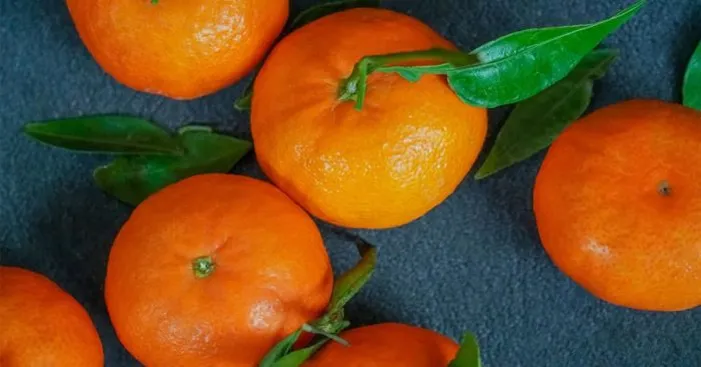
A great source of vitamin C:
Mandarin orange calories offer more than 50% of the daily needs of vitamin C per serving.
By getting almost half of what you need for vitamin C, you will ensure that your body meets the daily requirement of this essential nutrient.
You should know that vitamin C is important for growth, repairing damaged tissues, collagen formation, and activating the immune system…
Can treat constipation:
Not only vitamin C but mandarin orange calories are also a great source of fiber with 13% of the daily needs per serving of 2 fruits.
In case you don’t know, fibers are the building block of stool and they are the ones that absorb the moisture to ensure that it doesn’t dry out.
As a result, bowel movement becomes smoother reducing the risk of being constipated.
Can reduce the risk of anemia:
Again, a large amount of vitamin C in mandarin orange calories enhances the absorption of iron from the other food you consume.
Consequently, your body is getting the most iron possible out of the food you eat and this will ensure there is no lack of iron therefore less risk of anemia.
Boosts cardiovascular health:
Since vitamin C is responsible for tissue repairing and collagen formation, it ensures that the arteries and vessels are elastic and can withhold blood flow smoothly.
In other words, vitamin C will break down any plaque buildup within the arteries making the blood flow less vulnerable to strokes.
Expels uric acid:
Doctors and nutritionists always warn us about the bad effects of high uric acid as they can lead to bad diseases such as gout.
Whether you already have gout or not, introducing more mandarin oranges into your diet will reduce the effects related to this disease.
Therefore, it is always a great idea to juice mandarin orange on top of your favorite meat or seafood dish to neutralize the presence of uric acid in these types of food.
Beneficial for the teeth:
We all grew up hearing that sugar is bad for the teeth and somehow that led to the belief that fruits are bad for the teeth.
That is a myth! The sugar in mandarin orange would not cause tooth decay.
This is because the nutritional composition of this fruit is very well balanced as the antioxidants and anti-inflammatory components will strengthen teeth defense against harmful bacteria.
Helps with the flu:
Thanks to the high vitamin C content in mandarin orange calories, this fruit can strengthens the defense against the flu.
Not only that, but consuming mandarin oranges would also reduce the risk of a cold and reduce its symptoms once you get it.
Promotes good skin health:
Because mandarin orange calories are full of antioxidants and other nutritional components, it promotes the production of collagen.
You should know that collagen improves skin elasticity making it less vulnerable to stretch marks and wrinkles.
This could also counter the effect of aging as skin cells will be able to stay alive longer.
No wonder why many skin creams and lotion uses mandarin oranges extract thanks to their skin rejuvenating properties.
Moisturizes the hair:
With 4% of the daily needs in vitamin A per serving of two mandarin oranges, your body can produce more sebum (natural hair oil).
By providing enough oiling for the scalp, the hair grows shiny and healthy without the risk of developing dandruff.
Precautions before you consume mandarin orange calories:

Like any other food, consuming a large number of mandarin oranges can cause some side effects for some people.
Over-consumption of mandarin oranges can cause gastrointestinal issues like hernia, peptic esophagitis, or gastro-esophageal reflux disease.
This fruit can cause irritation in the gastrointestinal tract and that is due to its acidic content.
Therefore, it is recommended to not consume mandarin oranges while taking anti-inflammatory drugs such as aspirin to avoid acid reflux.
Mandarin orange calories contain Naringin, flavonoids component that neutralizes the effect of certain drugs, therefore, reducing their efficiency.
This blocking effect causes some drugs to accumulate in the blood and that can lead to undesirable effects caused by involuntary overdose.
Hence, we should consume no more than 2 mandarin oranges a day and should avoid consuming them while taking drugs.
Consuming mandarin orange:
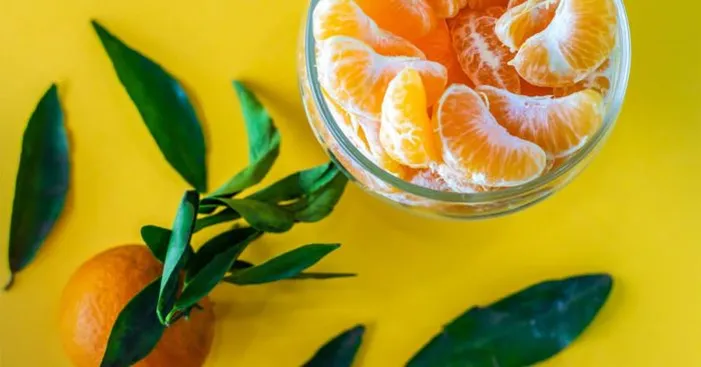
One of the most common ways to consume mandarin orange calories is to snack on a couple of these fruits as a dessert.
However, there are other creative ways to consume mandarin orange like:
- In a juice, with or without other citrus fruits.
- As the main ingredient for jams, jellies, and compotes.
- To freshen up a fruit salad.
- Added to smoothies.
- To make a puree using mandarin orange zest and use it as a topping for tarts and toasts.
- Using mandarin orange juice as a basic ingredient for salad dressings or marinades for meat and fish.
- To caramelize mandarin orange or is it to make an orange syrup that can be used to garnish pancakes and pies.
- Sauteed with garlic and then used to accompany chicken meat.
- Perfectly combine with seafood to add a fresh citrus flavor to the dish.
Storing mandarin:
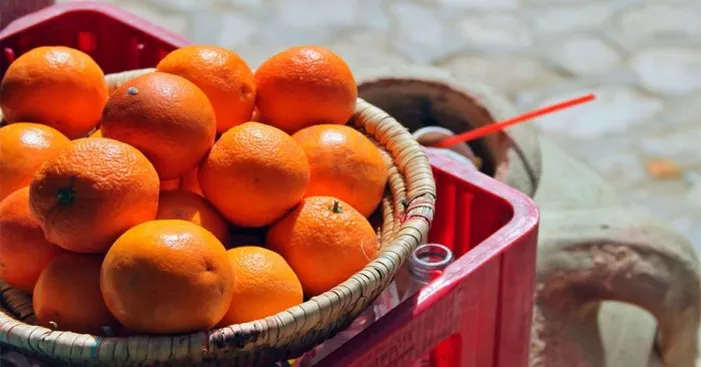
Generally, a room atmosphere is dry and that makes mandarin oranges lose their moisture.
Therefore, the best way to store mandarin oranges is by placing them in the fridge by placing them in a:
- Cardboard box.
- Vegetables and fruits drawer (make sure you don’t mix mandarin with anything else in the drawer).
- Plastic bags or boxes that have holes for aeration.
Before you store mandarin oranges in the fridge you need to check each one of the fruits and make sure they have no bruises or black spots as they can lead to cross-contamination.
Under the right conditions, you can store mandarin oranges in the fridge for up to 4 weeks.
In addition, you can freeze these oranges for up to 12 months and enjoy them all year round.
Buying mandarin
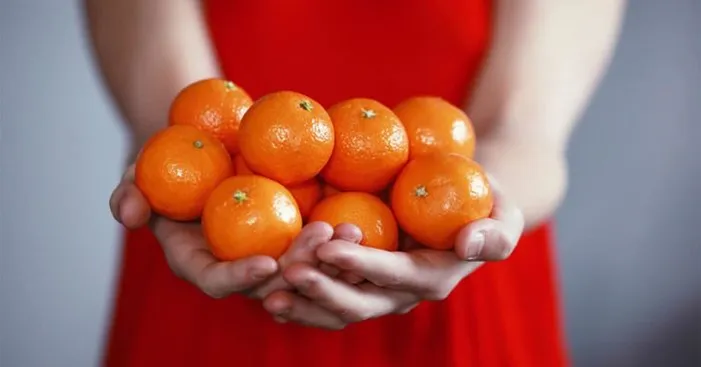
Buying fresh mandarin oranges may seem too easy but sometimes we discover bad surprises once we eat them.
To ensure that you buy the best quality mandarin you can follow these few tips:
- The main indicator of the freshness is the weight, the fruit must feel heavy and that means it has just got picked out from the tree.
- Know the difference between a mandarin and a clementine, commercial mandarin (satsuma) are sweeter and clementine has a tangy sweetness.
- If the stem is still intact alongside some green leaves, it’s a good sign of freshness and the fruit will keep a little longer.
- The peel of a fresh mandarin should not come off easily and if it does it probably indicates that it has already lost some of its moisture.
- The top side of a mandarin where the fruit was attached to the tree should be soft and white and if it is brown then the fruit I probably drying out.
